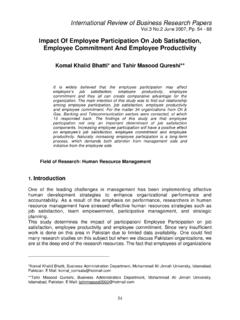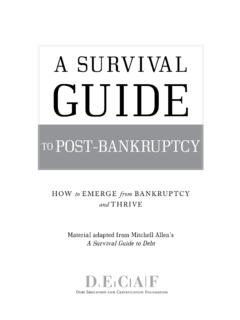Transcription of Theory and Accountability: The Case of Government ...
1 International Review of Business Research Papers Volume 6. Number 5. October 2010 Pp. 82 97. Theory and Accountability: The Case of Government Consolidated financial Reporting Victoria Wise1. The objective in this study is to examine the existing literature regarding the antecedents to public sector accountability performance by including a new variable: preparer-commanders' beliefs about the usefulness of whole-of- Government consolidated financial reporting. Goldberg's (1965) Commander Theory was used as a relevant theoretical framework. Survey results provided insights into the beliefs of preparer-commanders as to the usefulness of whole-of- Government consolidated financial reports for the discharge of accountability. While there appears to be a view that such reports may be useful for decision-making purposes, there is relatively less evidence to suggest that this type of information is suitable for the purposes of Government resource allocation decisions.
2 1. Introduction The idea of a state, formed by individuals who have united together, and which is governed by elected individuals, implies the existence of a social contract between the electors and the elected (Runes, 1962:p293). As ownership of the state s resources does not exist in any legal sense, control over those resources and, thus accountability for them is conferred by the individuals who form the state, on those elected to govern the state. Whether consolidated financial information is useful for the discharge of accountability for such resources is examined in this study. Commander Theory Commander Theory as posited by Goldberg (1965:pp162-7) could help in this examination. Commander Theory rests on the assumption that although an owner of resources may also be the controller of those resources, ownership and control are separate notions.
3 That is, ownership is a legal condition, but control is a function that can only be exercised by human beings. Ownership of resources is sometimes, but not always accompanied by effective economic control of those resources and this function of controlling or managing resources can be thought of as distinct from the legal or even social ownership of them (Goldberg 1965:p162). Goldberg (1965:p166) defines control over resources as a command and, in respect to Government , identifies Parliamentary Ministers as commanders at the top level of a hierarchical system of command. Invoking commander Theory , if resources of the state are allocated to specific Government organisations or for certain activities and functions, they are ultimately controlled by an individual commander who is a Minister and who is also responsible and accountable for those resources.
4 Goldberg 1. Biographical Note: Victoria wise is an Associate Professor in the Deakin Business School, Deakin University, Melbourne, Australia. Victoria can be contacted on her email at: wise also envisaged lower levels of command. These comprised permanent Heads of Department who guide the policy of Ministers. Effectively, they are commanders in this respect as well as in their capacity of carrying out policy decisions. Goldberg (1965:p167) submitted that accounting reports are prepared by lower-level commanders to commanders at a higher level to serve many purposes. For instance: to provide documentary evidence for decisions made by commanders; for control of activities relating to resources; to enable decisions to be made by resource controllers; and, to allow decisions to be made on a basis of reasoned interpretation rather than guesswork.
5 Commander Theory forms a theoretical foundation in which to analyse the impact of a cross-sector transfer of accounting principles and rules to the public sector. It provides a strategic posture toward financial report disclosure activities and assists in developing an understanding of the relative power of report preparers on levels of financial report disclosure. This theoretical framework can be used to help explain whether certain environmental artefacts constitute significant impediments to the cross-sector transfer of the consolidated financial reporting practice to the public sector. Specifically, it provides an examination of the beliefs of the top-level and lower-level commanders as to the usefulness of consolidated financial reports for accountability purposes. Goldberg s top-level commanders use consolidated financial reports to discharge their accountability for Government resources under their control.
6 They constitute the primary financial report user group in this study and will be described as user- commanders . Heads of Departments are authoritative public sector policy-makers in respect to guidance for financial report content and preparation. They are described as dominant preparer-commanders in this study. Public sector officials responsible for the compilation and exercise of judgment in the preparation of such reports, and the Auditors-General responsible for monitoring the reporting process and the output of that process are described as subordinate preparer-commanders . Consolidated financial reporting Consolidated financial reporting is an accounting technique in which two or more individual entities are reported as if they are one common entity. In order to prepare consolidated financial reports, separate sets of accounting reports are aggregated and certain other adjustments made to arrive at consolidated totals.
7 For instance inter-entity security holdings are eliminated, as are inter-entity transactions and the profits (or losses) (Chambers 1969:pp631-2). Consolidated financial reporting in the Australian private sector has been regulated by an accounting standard since June 1992 however it was not until June 1999 that this particular form of financial reporting was required to be applied by Australian Government entities at the whole-of- Government level. Accountability and usefulness A substantial body of literature exists on accountability and performance, much of it having been produced across the last four decades. What stands out in the relevant literature is the multiplicity of views with respect to the notion of accountability, and the nature of relationships between these factors and the practice of consolidated 83. wise financial reporting (Simms, 1999).
8 Some researchers in this field have implied that this is partly due to the poor conceptualisation of the nature of accountability and the weak theoretical foundation of the consolidated financial reporting literature (Walker, 1976:p114). The accounting regulators clearly link the concepts of control and accountability and view control as the appropriate criterion for determining the components of the whole-of- Government entity for the purposes of providing useful financial information. However, what appears to be lacking are models of accountability and of consolidated financial reporting that can be viewed as superior or that are generally favoured in the literature. In the Australian public sector, Ministerial Heads of Departments are accountable to an elected assembly of Parliamentary Ministers (Birch, 1996:p20), and at a party level to the governing party (Lucy, 1993:p3).
9 The Auditors-General provide assurance as to the accountability of public sector operations and performance, and the wider political processes of elections and interest group advocacy connect Parliament through its Ministers, to the people and so makes Government more open than it would otherwise be (Aldons, 2001). Broadbent and Laughlin (2003) argue that despite this implied notion of accountability governments only make themselves accountable in a political rather than a managerial sense. The Australian conceptual framework directing financial reporting (the conceptual framework ) identifies two variables as antecedents to usefulness of financial information: these are relevance and reliability. Further, the consolidated financial reporting technique is identified as a method that produces relevant financial information that is useful to users of financial reports for their own decision-making purposes.
10 A focus in this study is whether consolidated financial reports are a useful tool for the discharge of the accountability for Government resources. Research questions and study objectives In specifying the major research question, the achievement of one principal research objective is sought. This objective is to extend, significantly, the existing literature regarding the antecedents to public sector accountability performance by including a new variable: preparer-commanders beliefs about the usefulness of whole-of- Government consolidated financial reporting. On this basis, the major research question is presented: Are whole-of- Government consolidated financial reports useful for the discharge of financial information accountability by commanders? Importance of the topic The significance of this study relates to the sector under study.




